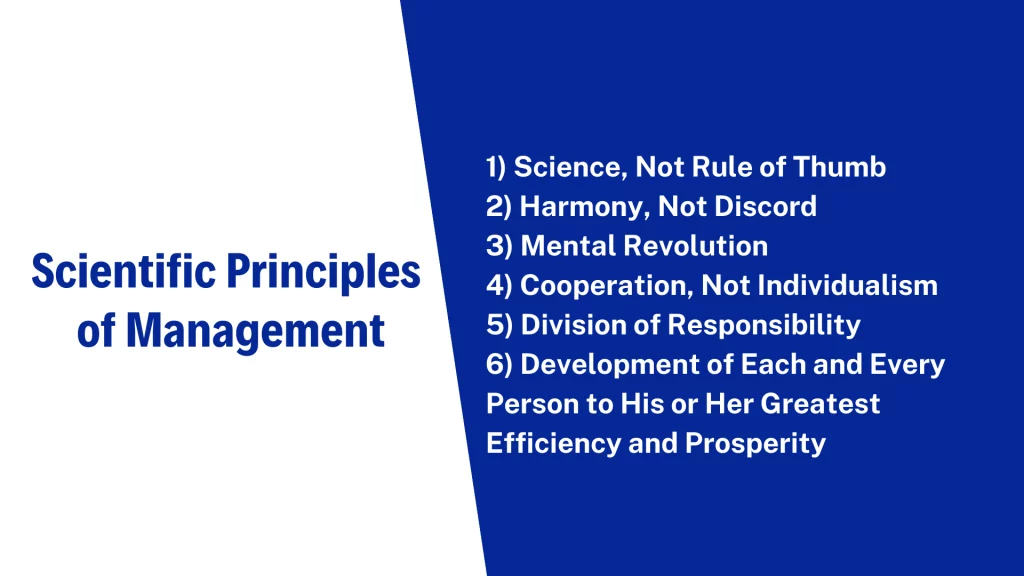Scientific Principles of Management | Free Management Blogs
Scientific Principles of Management

Scientific Principles of Management
Taylor (1856-1915) was an American who started his career as a machinist in Midvale Steelworks, Philadelphia and gradually through his hard work and progress, rose to the position of the Chief Engineer. He introduced his observations and experiments based on scientific data. Taylor’s approach towards management is termed as scientific management. For this contribution in development of management thoughts, he is known as the “Father of Scientific Management”.
Taylor’s management theory is based on scientific experiments. This theory involves the application of scientific approach to decision making and solving them at the same time. According to Taylor, problems should be solved by scientific techniques rather than the rule of thumb and a trial and error approach.
Definition of Scientific Management by Fredrick Taylor: “Scientific Management consists of knowing what you (i.e. management) want men to do exactly; and seeing it that they do it in the best and the cheapest manner.”
- Nature of Principle of Management
- Importance of Principles of Management
- Henri Fayol 14 Principles of Management
- Scientific Principles of Management
- Techniques of Scientific Management
1) Science, Not Rule of Thumb
In order to increase organizational efficiency, the ‘Rule of Thumb’ method should be substituted with the methods developed through scientific analysis of work. Rule of thumb decisions are based on personal judgments of the manager. Taylor insisted upon scientific method for every small work.
This principle is concerned with selecting the best way of performing a job after scientific analysis of that job and not by trial and error methods. Standard required time and standard output should be defined by the manager. This will help in saving time and human energy and will result into expected standard output. According to Taylor, even a small production activity like loading iron sheets into box cars can be scientifically planned.
2) Harmony, Not Discord
According to this principle, there should be harmony between the employees and management. This coordination will help in minimizing conflicts between them. Perfect understanding between employees and management will be helpful in creating healthy work environment for achieving the desired goal i.e. success. Organization should think about maximum prosperity of employees also.
3) Mental Revolution
Taylor introduced the concept of “Mental Revolution”. This principle focuses on change in the attitude of employees and management towards each other. Both should realize their equal importance in organization. They should give full cooperation for achieving goal of organization. This will increase productivity and profits.
4) Cooperation, Not Individualism
This principle emphasizes on mutual cooperation between workforce i.e. employees and management. Due to cooperation, trust, team spirit etc. internal competition will turn into healthy working environment. Management should always consider the suggestions given by employees in decision making process.
Employees should be treated as an integral part of organisation in all respects. At the same time employees should resist themselves from going on strikes and making unnecessary demands from management. They should treat each other as two pillars of organization.
5) Division of Responsibility
Proper division of work should always be accompanied with division of responsibilities between the managers and employees. Major planning is done by the top and middle level management authorities whereas employees are concentrating on its execution. The reporting is done as per the instructions given by their superiors. Managers should always help, encourage and guide the employees. It helps for best performances of managers as well as employees.
6) Development of Each and Every Person to His or Her Greatest Efficiency and Prosperity
Best performance of any organization always depends on the skills and capabilities of its, employees to a great extent. Thus, providing training and development programmes to the employees whenever required, is very essential. It ultimately affects the profitability of the, organization. Each employee should be given proper opportunity to attain greater efficiency and maximum prosperity.


